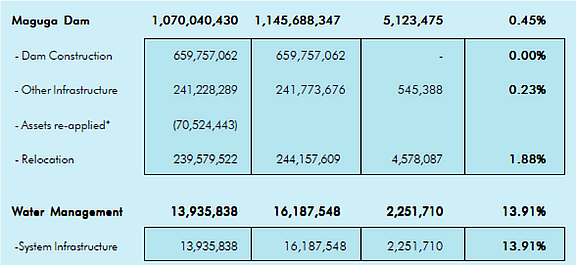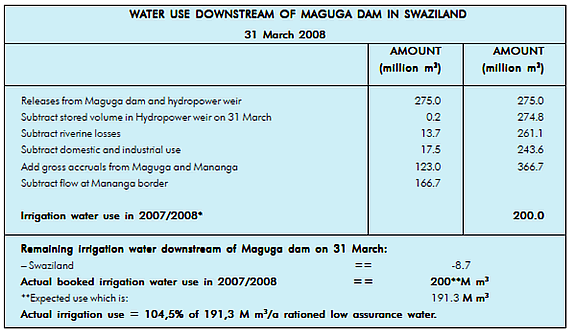 Komati Basin Water Authority(KOBWA)
Komati Basin Water Authority(KOBWA)
All data are collected in the Fiscal Year of 2008-2009.
Company Profile and History
The Komati Basin Water Authority (KOBWA) is a bi-national institution established in 1993 through the Treaty on the Development and Utilization of the Water Resources of the Komati River Basin signed in 1992 between the Kingdom of Swaziland and the Republic of South Africa. The purpose of KOBWA is to implement Phase 1 of the Komati River Basic Development Project. Phase 1 comprises the design, construction, operation and maintenance of Driekoppies Dam in South Africa (Phase 1a) and the Maguga Dam in Swaziland (Phase 1b).
Water Management is responsible for management and planning of all activities related to the operation of the project which includes the maintenance and operation of the bulk infrastructure, system operations, system development, emergency preparedness and other functions related to water management.
In Country Location
Head Office, Maguga Dam, Pigg’s Peak, Swaziland;
Telephone: +268 437 1463/4
Telefax: +268 437 1460
Services and Products
KOBWA has, over the years, evolved from a developmental entity focused on construction management and matured into an operational authority dealing with water resources distribution and risk management.
Number of Employees
23 (Swaziland); Total: 41
Financial Information
For the year ending March 2008 KOBWA distributed 447 million m3 of irrigation water to the two member countries. An estimated income of R/E 4.0 million was realized from the production of approximately 18,000 tons of sugar cane on 200 ha by farmers resettled in the Host Area of Swaziland. To date the total capital investment in the Komati Basin Development project (phase 1a and b) amounted to R/E 1,716,006,300 (99.03 % of projected capital invest
Total capital investment and projected capital cost to completion

Market Share
Maguga Hydro Power Station contributes 43% to Swaziland Electricity Company (SEC’s) internal generation.
Water use by Swaziland

Business Objective
“To ensure that water resources harvested by the project as well as other natural resources and infrastructure available within the area of operation are managed in a sustainable manner to maximize the long term benefits of the project to all stakeholders”
Business Model
During 2008 KOBWA engaged in a strategic planning exercise to determine how KOBWA should refocus to maximize the future benefits to the two countries (South Africa and Swaziland). It became clear that KOBWA could add value by utilizing the expertise and capacity that was developed over the past 15 years by the following: short-term focus on revising of internal policies, procedures and systems to streamline procedures and improve productivity; extending services to include the implementation of projects and actions aimed at promoting sustainable socio-economic development within its existing area of operation; add value by rendering water management services as required by the countries using existing capacity; proceed with the first phase of the future development study aimed at optimizing the utilization of the current water infrastructure available in the Komati Basin; the development of a mutually agreed ecological reserve for the river system and a management program for implementation is another priority.
Ownership of Business
KOBWA was established by the Governments of the Kingdom of Swaziland and the Government of the Republic of South Africa. Both the Treaty of the Establishment and Functioning of the Joint Water Commission and the Treaty on the Development and Utilization of the Water Resources of the Komati River Basin recognize the rights of Mozambique to a reasonable and equitable share of the water resources of shared rivers. A Tripartite Technical Committee (TCTP), established under the Tripartite Agreements between Swaziland, South Africa and Mozambique, is responsible inter alia for the identification and prioritization of capacity-building challenges and opportunities in the water sectors of the three parties and the establishment of regime allocations.
The Joint Water Commission (JWC) was established as a technical advisory commission to advise the Governments of the Kingdom of Swaziland and the Republic of South Africa on water resources of common interest. The JWC was formed through the JWC treaty signed in 1992. There are three commissioners appointed by each Government for a period determined by each Government.
Benefits Offered and Relations with Government
Swaziland does not have a clear policy on water use and management. The overall management of water resources therefore takes place on an ad hoc basis through several uncoordinated pieces of legislation, spread among a number of Ministries as well as other institutions outside the government. However, the Water Act of 2003 has pronounced policy nuances that address important allocative, regulatory and institutional issues, all of which have relevance to the irrigation sector.
KOBWA as a public entity is guided, in particular by the National Water Acts and legislation relating to the management of public funds applicable to the two member countries of Swaziland and South Africa. These have ensured that KOBWA is operating within a regulated legal and financial framework and conducted its business effectively and efficiently.
Both Governments have legislation aimed at the protection of the Environment. In Swaziland, the Swaziland Environment Authority (SEA) is the responsible agency for the protection of the environment. SEA legislation requires an Environmental Impact Assessment and a Comprehensive Mitigation Plan for all large projects, such as the Maguga Dam, that are likely to have a significant impact on the environment. The Government of Swaziland through the Swaziland Komati Project Enterprise (SKPE) retained the monitoring role for socio-economic, health and land-use. SKPE was then renamed the Swaziland Water and Agricultural Development Enterprise (SWADE) and was given the responsibility to facilitate the utilisation of Maguga Dam water for the development of emerging farmers downstream of the dam.
Product Development
In order to promote trust and confidence amongst the parties and water users, KOBWA requires reliable decision support tools to operate the river system. Currently KOBWA is using the Water Administration System (WAS) and the Rationing Model. During the year KOBWA procured the Mike BasinTM software with the aim of evaluating its capabilities for use to enhance system performance. Mike BasinTM incorporates features such as GIS that will make system configuration simpler and faster. Preliminary results of the evaluation indicate a good performance of the software. The evaluation will be concluded during the next water year. Other decision support tools under evaluation by KOBWA include the STELLA model, a shared vision model that can be used for planning purposes and specifically during the development of the drought preparedness plan.
Pigg's Peak regularly experienced water shortages. The Project constructed a bulk water supply system from the Maguga Dam to Pigg's Peak. The construction of a bulk water supply was a joint venture between the Project and the Swaziland Water Services Corporation (SWSC), which financed the treatment plant at the dam and the storage reservoir in Pigg's Peak. The system comprises of five booster stations and a provision of 10 L/s water supply for communities along the North Access roads. This system, operated by SWSC, was intended to alleviate the frequent water shortage problem in Pigg's Peak up to 2010.
The community nursery established near the Maguga dam is producing fruit trees and vegetable seedlings with the assistance of a horticulturist from the Ministry of Agriculture (MOAC). The objective of the nursery is to provide both medicinal and other plants to the community and the public. To date the nursery has produced more than 3000 fruit tree saplings for the public. They are also actively involved in the vegetable production unit which was established as a demonstration plot to train local communities. The vegetable unit is supplying the Maguga Lodge with fresh produce and has been selling surplus vegetables locally.




